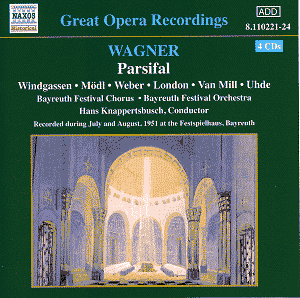First produced at Bayreuth on July 26th
1882, Parsifal was Wagner’s last opera. Set to the composer’s
own words based on a 13th century poem its themes of
purification and redemption were seen to be an ideal offering
at the eagerly awaited resumption of the annual ‘Festival’ in
1951. It was ideal as there was trepidation in some quarters as
to how the resumption would be viewed and received. Wagner’s music
had after all been subject to ‘Nazification’. Wagner’s daughter-in-law
had afforded a warm welcome to Hitler and his senior lieutenants
during the Second World War at a time when informed Germans were
aware of the suffering being inflicted on the Jews.
Great care was taken in casting which also provided
an opportunity for the mixing of nations and generations. This
casting, the advent of magnetic tape recording with all its potential
for long takes, and the emerging LP record all combined to draw
the record companies like bees to the proverbial honey-pot. Regrettably,
the senior producers and engineers who descended on the Festival
were not accompanied by lawyers, as at least one recording didn’t
see the light of day for nearly fifty years because of ‘contractual’
difficulties; that is, an artist singing in a recorded performance
was ‘exclusive’ to another label when the term meant exactly what
it said!
This Parsifal recording was a resounding success
when it was issued on seven LPs (Decca LXT 2651 through 2657).
Outstanding in the singing cast is the Gurnemanz of Ludwig Weber.
He was a Germanic (Austrian by birth) black bass with steady well-coloured
and covered tone (CD 1 tr 3, 6-7) and the ability to inflect a
phrase to give whatever emotion is called for; gentility, frustration,
anger, horror or love. Too many singers fail to exhibit this level
of skill. His steadiness is particularly noteworthy given the
conductor’s slow tempi, particularly in the first act and the
early pages of act 2. Some critics have ascribed the virtue of
intensity to this slowness. Well, the conductor’s second recording
of the work made at the 1962 Festival is no less intense and is
over twenty minutes faster! (Currently available on Philips ‘50
Great Recordings’). As the eponymous hero Windgassen, aged 37
at the time of the recording, is ardent and fresh voiced; one
of the best Parsifals on disc. As Kundry, Martha Modl was at the
turning point from mezzo to dramatic soprano. Her singing is full
toned, vibrant and expressive, although smoothness of legato is
not a phrase one is tempted to use. George London and Arnold van
Mill are strongly characterful and sonorous whilst the Klingsor
of Hermann Uhde is thrilling in his characterisation albeit there
is a touch of raw tone at the top of the voice (CD 3 tr3). The
chorus is excellent and although set a little further back than
the soloists play a full and appropriate part in the proceedings.
The mono recording is somewhat constricted although
not without depth. The acoustic at Bayreuth is such that several
of the succeeding recordings of Parsifal were made live in that
theatre. The Naxos producer notes that ‘changes in perspective
and audience noise are noticeable at some of their (i.e. Decca’s)
edits, and continues ‘there are other problems with the original
master, including post echo and swishing sounds … during the loud
portions of Act 2’. However, recording quality is not the issue
here, rather it is the history of the occasion and the outstanding
quality of the singing. For those for whom recording quality is
all, Karajan (DG), Solti (Decca) and more recently Baremboim (Teldec)
have all made studio recordings with good singing casts. I certainly
wasn’t too disturbed by the sonic limitations here particularly
with such outstanding singing to be heard. Those who like to hear
outstanding singers practising their art or who want to get to
know the opera at an affordable price should not hesitate.
Robert J. Farr
See also reviews
by Tony Haywood and Jonathan Woolf
